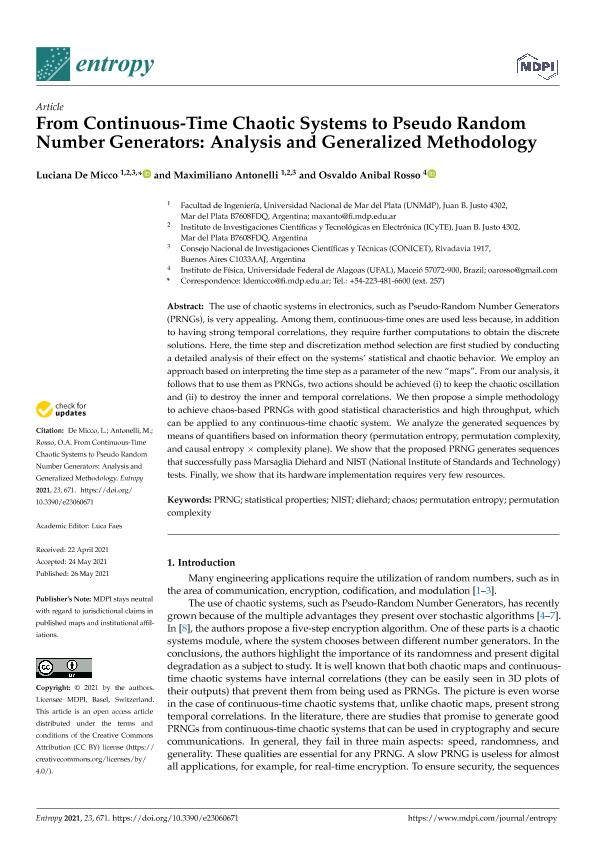Artículo
From continuous-time chaotic systems to pseudo random number generators: Analysis and generalized methodology
Fecha de publicación:
05/2021
Editorial:
Molecular Diversity Preservation International
Revista:
Entropy
ISSN:
1099-4300
Idioma:
Inglés
Tipo de recurso:
Artículo publicado
Clasificación temática:
Resumen
The use of chaotic systems in electronics, such as Pseudo-Random Number Generators (PRNGs), is very appealing. Among them, continuous-time ones are used less because, in addition to having strong temporal correlations, they require further computations to obtain the discrete solutions. Here, the time step and discretization method selection are first studied by conducting a detailed analysis of their effect on the systems’ statistical and chaotic behavior. We employ an approach based on interpreting the time step as a parameter of the new “maps”. From our analysis, it follows that to use them as PRNGs, two actions should be achieved (i) to keep the chaotic oscillation and (ii) to destroy the inner and temporal correlations. We then propose a simple methodology to achieve chaos-based PRNGs with good statistical characteristics and high throughput, which can be applied to any continuous-time chaotic system. We analyze the generated sequences by means of quantifiers based on information theory (permutation entropy, permutation complexity, and causal entropy × complexity plane). We show that the proposed PRNG generates sequences that successfully pass Marsaglia Diehard and NIST (National Institute of Standards and Technology) tests. Finally, we show that its hardware implementation requires very few resources.
Archivos asociados
Licencia
Identificadores
Colecciones
Articulos(ICYTE)
Articulos de INSTITUTO DE INVESTIGACIONES CIENTIFICAS Y TECNOLOGICAS EN ELECTRONICA
Articulos de INSTITUTO DE INVESTIGACIONES CIENTIFICAS Y TECNOLOGICAS EN ELECTRONICA
Citación
de Micco, Luciana; Antonelli, Maximiliano; Rosso, Osvaldo Anibal; From continuous-time chaotic systems to pseudo random number generators: Analysis and generalized methodology; Molecular Diversity Preservation International; Entropy; 23; 6; 5-2021; 1-17
Compartir
Altmétricas




